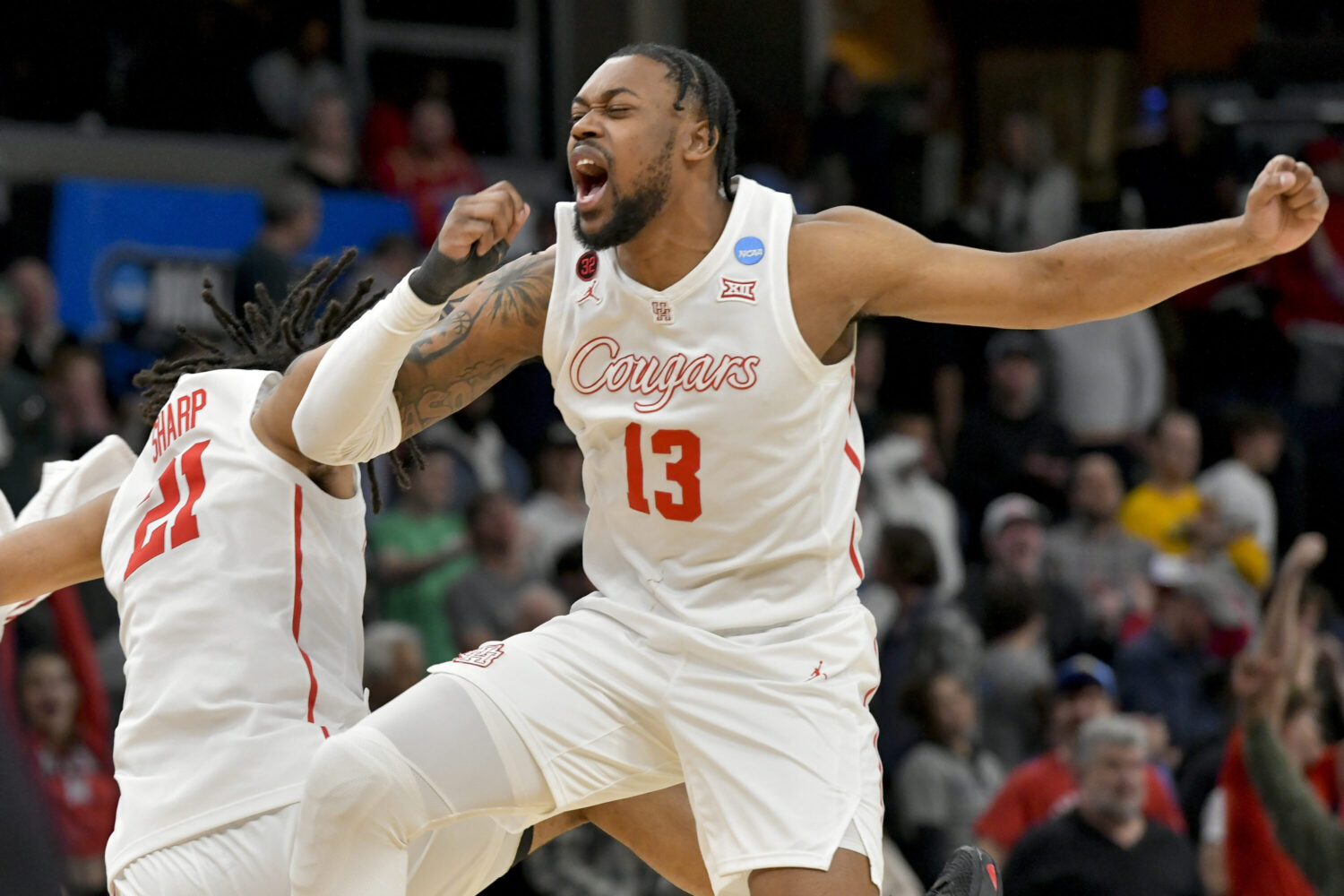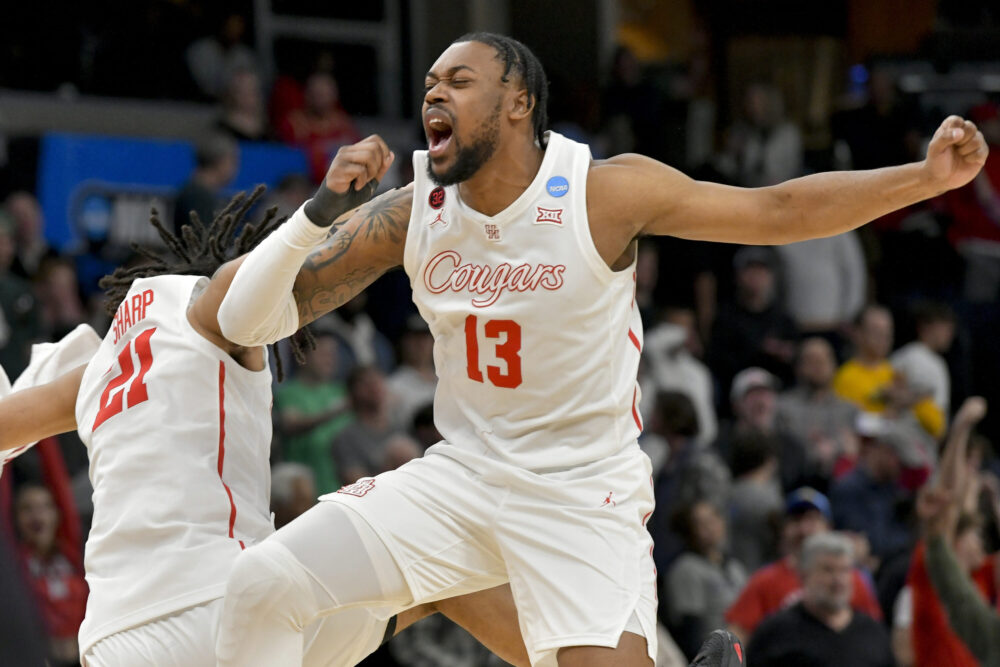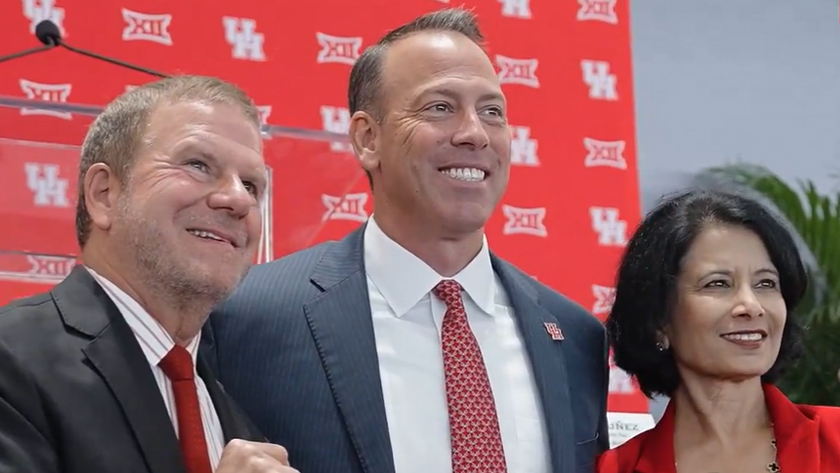AP Photo/Brandon Dill
Houston forward J’Wan Roberts (13) and guard Emanuel Sharp, left, celebrate the team’s win in a second-round college basketball game in the NCAA Tournament, Sunday, March 24, 2024, in Memphis, Tenn. Houston won 100-95 in overtime.
A new era is underway in college athletics as schools across the country are now permitted to make direct payments to their student-athletes.
A revenue sharing system was created as part of a multibillion-dollar settlement reached last month in a series of federal antitrust lawsuits against the NCAA, which for years had been criticized for exploiting amateur athletes in the big business that is college sports. Tuesday was the first day that colleges and universities in the NCAA’s top division could begin paying their players, with a nationwide annual cap set at $20.5 million per school.
The University of Houston, along with other members of the Big 12 Conference and other prominent leagues, will be dispersing the full amount among its athletes. UH athletic director Eddie Nuñez said Tuesday that initial payments would be made within the coming days.
“As much as people out there are saying this is going to be tough or not going to work or this or that, the reality is this is the first time we’ve had some true guardrails that are going to allow us to be successful,” he said. “We have to buy in. We have to do this.
“Is it perfect? No,” he added. “But if we can all circle the wagons and do what we need to do, we can get this right.”
Nuñez said university officials are still determining how exactly to distribute the payments, which will come from a variety of funding sources – including the athletic department budget, corporate sponsorships, broadcast rights deals and donations from alumni, boosters and fans. UH’s athletic budget for the current fiscal year is a little more than $90 million, he said, and is expected to increase for the next fiscal year.
The majority of the $20.5 million to be paid will go to football and basketball players, Nuñez said, because those sports generate the most revenue. The university’s men’s basketball team has been among the best in the nation in recent years, with the Cougars reaching the NCAA championship game last season.
Nuñez could not say whether every student-athlete at UH will be receiving a piece of the revenue-sharing pie, but noted the school will be increasing the number of scholarships it awards across its athletic programs, while utilizing partial scholarships. Out of the $20.5 million to be distributed, Nuñez said schools must use $2.5 million to fund new scholarships.
“We’re working right now to make sure that every program has the ability to distribute something,” he said.
University of Houston
Eddie Nunez, center, is introduced as the University of Houston’s athletic director on August 21, 2024.
Beyond revenue sharing, student-athletes can continue to secure their own endorsement deals with private companies. Those types of name, image and likeness (NIL) agreements have been part of the college sports landscape since 2021.
NIL deals, and the new revenue sharing system, will both be regulated by the newly created College Sports Commission. Nuñez said “a little less than half or half” of UH student-athletes have previously benefitted from NIL agreements.
The athletic director also pointed out that, at a time when college athletes are beginning to be compensated like their professional counterparts, the players at UH have not abandoned the “student” portion of their roles on the Third Ward campus. Nuñez said the athletic department set a school record last spring with an overall grade-point average of 3.32.
“I’m proud of that,” he said. “Not many people can say their academics went up in this new era.”
As for the Cougars’ athletic performance under a revenue-sharing model, Nuñez said fans should not see any changes, at least in the short term. The university’s athletic department has been preparing for this change for the last year and is “positioned for success,” he said.
“It’s going to help us thrive here,” Nuñez said. “I really believe that this is going to allow us to achieve success across the board. It will give us a chance.”
Houston Public Media is licensed to the University of Houston System. The university does not play a role in Houston Public Media’s editorial decisions. Read our statement of ethics and standards here.


